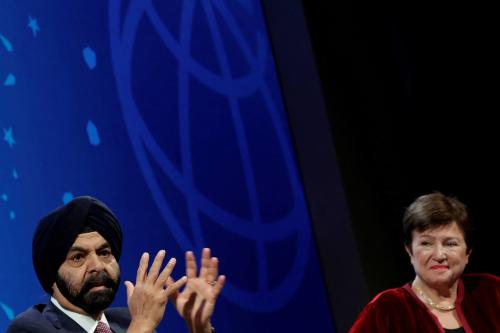If Paul Wolfowitz resigns as President of the World Bank, how should his successor be chosen? If the world community acts sensibly, the choice will not be, as in the past, determined by the U.S. Government alone.
A presumption that the President of the World Bank should always be an American is indefensible. Yes, when the World Bank and the International Monetary Fund (IMF) were created more than six decades ago, an informal convention was agreed between the Americans and Europeans that the United States would designate the President of the World Bank while the Europeans would designate the IMF’s Managing Director. Even long ago, that convention — a side agreement nowhere reflected in the charters of the two organizations — was a questionable political compromise among the major postwar powers. In today’s world, the old side agreement should be jettisoned and replaced with selection procedures that reflect two key principles: transparency of process, and competence of prospective leadership.
The IMF and World Bank in recent years have strongly advocated greater transparency for financial transactions and national governance. And they have made available much more information about their own operations. National governments should promote a comparable transparency for the selection procedures for the top posts in these organizations. After the decision process is completed, for example, the names of the candidates seriously considered should be announced and a public report should summarize key aspects of the Executive Board’s deliberations.
The selection procedures themselves should identify multiple candidates who are deemed by governments or outside observers to be highly qualified. Nominations should be made to the Executive Board of the organization (where after advice from member governments the ultimate decision is taken) without undue emphasis on candidates’ national origins. At the outset the Executive Board should indicate that an individual from any of the 185 member nations is eligible to be chosen, regardless of geographical origin. Because judgments about competence are inevitably controversial, the Board’s choice of the best qualified person among the multiple candidates will of course be difficult. If the dominant criterion is a candidate’s competence, however, member nations are more likely to converge on an ultimate choice by the Executive Board.
Rough guidelines emphasizing transparency and selection on merit regardless of nationality already exist. Following the contentious selection of Horst Köhler as the IMF’s Managing Director in 2000, working groups were established in both the IMF and the World Bank to review selection processes. The 2001 reports of the working groups were bland and were never officially endorsed. But they remain on the table and could now be approved and implemented.
Improved selection procedures for the leadership of the World Bank and the IMF could be a stimulus for progress on even more basic issues of reforming the governance of the institutions. Because of historical and political inertia, Western European nations and even the United States exert voting influence and control of Executive Board constituencies disproportionate to those of the rest of the world’s nations. For the two institutions to be perceived as legitimate, responding equitably to all the world’s people, adjustments in the relative sizes of countries’ quotas and voting powers to mitigate those imbalances are needed. Such adjustments, now under discussion in ongoing negotiations, are politically complex.
The governments of the United States and European Union countries, taking a far-sighted step to improve leadership selection procedures, could favorably transform the prospects for constructive reform of the IMF and World Bank. The United States should announce that it will no longer presume that the President of the World Bank should be an American and that the United States will support an open and transparent process to choose Wolfowitz’s successor independently of candidates’ national origin. Analogously, European Union governments should state that they will, when next a new person needs to be chosen as Managing Director of the IMF, encourage the nomination of multiple candidates and will support the best qualified candidate without regard to whether the person is European or non-European.



Commentary
Op-edWorld Bank Leadership: What Next?
April 27, 2007